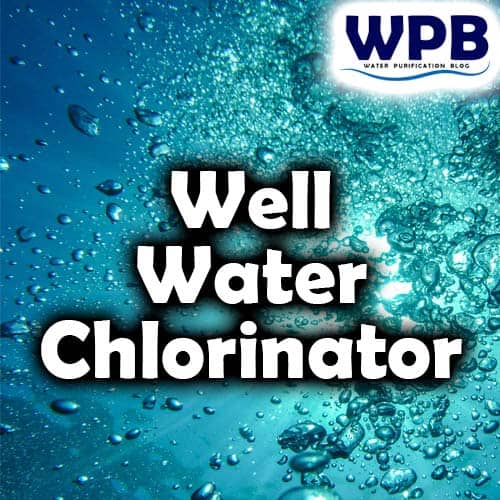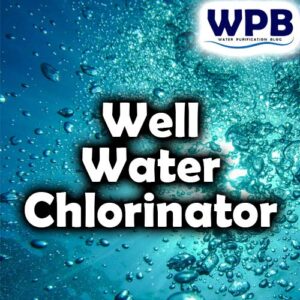The Ultimate Guide to Ensuring Safe Well Water with a Chlorinator
Absolutely the first thing in determining any type of water treatment is to make a water analysis. Chemical and microbiological analysis should be made, as they will determine the required water purification methods.
Table of Contents
When it comes to the microbiological safety and purity of well water, one of the most effective methods is chlorination.
As the most important aspect of water quality is that it is microbiologically safe, chlorination plays a vital role in purifying well water and eliminating potentially harmful bacteria and viruses.
Well water, although a natural source, is susceptible to various pollutants and contaminants. These may include bacteria, such as coliform and E. coli, as well as other harmful microorganisms that can pose serious health risks if consumed.
Moreover, well water can also contain elevated levels of sulfur, manganese, iron, arsenic and other substances that can affect its taste, odor, and appearance.
These issues may arise due to geological factors, surrounding land use, or aging infrastructure. Therefore, it becomes crucial to employ effective treatment methods to ensure the safety and quality of your well water.
Why Chlorinate Your Well?
Chlorinating your well is a crucial step in maintaining microbiologically clean and safe drinking water.
By injecting chlorine into the well water supply, you can effectively kill harmful bacteria and viruses that may be present. Regular chlorination helps prevent waterborne diseases and ensures the well water meets the required health standards.
When Should You Chlorinate Your Well?
Knowing when to chlorinate your well is important for maintaining its safety and integrity. It is generally recommended to chlorinate your well at least once a year, preferably in the spring.
However, there are other circumstances where chlorination becomes necessary, such as when your annual water test results indicate the presence of any kind of bacteria.
By monitoring the quality of your well water and conducting regular tests, you can determine the appropriate timing for chlorination.
Is Chlorination Safe?
Chlorination is a widely accepted and safe method for purifying well water. While there are alternative methods available, such as ultraviolet (UV) treatment or filtration systems, chlorination remains the most commonly used technique.
When used in the correct dosage, chlorine effectively eliminates harmful pathogens, making the water safe for consumption.
The Role of Well Water Chlorinators
1. Disinfection and Bacterial Control
One of the primary reasons why you need a well water chlorinator is for disinfection and bacterial control. Chlorination is a widely recognized and proven method for eliminating harmful bacteria and microorganisms from water sources.
By introducing chlorine into your well water, you can effectively eradicate bacteria, viruses, and other pathogens, safeguarding the health and well-being of your household.
2. Prevention of Waterborne Diseases
Waterborne diseases, such as cholera and giardiasis, can be transmitted through contaminated well water. These illnesses can cause severe gastrointestinal distress and pose a significant threat to human health. However, by utilizing a well water chlorinator, you can greatly reduce the risk of waterborne diseases, ensuring the safety of your family and loved ones.
3. Removal of Unpleasant Odors and Tastes
In addition to disinfection, well water chlorinators also aid in eliminating unpleasant odors and tastes that may be present in your water supply.
Chlorine effectively neutralizes the sulfur compounds responsible for the notorious “rotten egg” smell, as well as other chemicals that contribute to foul tastes and odors. With a well water chlorinator, you can enjoy clean, fresh-tasting water straight from your tap.
4. Improved Water Clarity
Furthermore, a well water chlorinator can enhance the visual clarity of your water.
If your well water appears cloudy or contains sediment particles, chlorination can assist in reducing these impurities, resulting in crystal-clear water that is aesthetically pleasing and enjoyable to use.
Choosing the Right Well Water Chlorinator
Now that we’ve established the significance of well water chlorinators let’s explore how to choose the right one for your specific needs. It’s essential to consider the following factors when selecting a well water chlorinator:
1. Water Quality Testing
Start by conducting a comprehensive water quality test to identify the specific contaminants present in your well water. This will help determine the appropriate chlorination dosage and ensure the most effective treatment.
2. System Capacity and Size
Consider the size of your well and the water demand of your household when selecting a chlorinator system. It’s crucial to choose a system with adequate capacity to meet your water usage requirements while maintaining optimal disinfection levels.
3. Chlorine Injection Method
There are various methods for chlorine injection, including the use of well pump pressure switches, flow switches, or proportional-feed flow meters.
Each method has its advantages and considerations, so consult with a professional or refer to manufacturer guidelines to determine the best option for your well.
4. Maintenance and Monitoring
Lastly, ensure that the chosen chlorinator system is easy to maintain and monitor. Regular maintenance, including monitoring chlorine levels, cleaning or replacing components, and servicing the system, is vital to ensure its long-term performance and effectiveness.
Conclusion
In conclusion, the importance of well water chlorinators cannot be overstated. By utilizing a well water chlorinator, you can effectively disinfect your water, eliminate harmful bacteria, and improve the overall quality and safety of your well water supply. With the ability to remove unpleasant odors, tastes, and impurities, a well water chlorinator provides you and your family with clean, healthy water for various household uses.
Remember, when choosing a well water chlorinator, consider factors such as water quality testing, system capacity, chlorine injection method, and maintenance requirements. By making an informed decision and implementing the right chlorination system, you can enjoy the peace of mind that comes with having safe and great-tasting well water.
Now that you’re equipped with valuable knowledge about well water chlorinators, make an informed decision and take the necessary steps to ensure the safety and quality of your well water supply.

Who am I?
I am working as a water treatment technical manager and I have more than 25 years of practical experience in water purification.
Water purification expert
After many years of experience in water purification, I want to share some of my knowledge and get people to know the real importance of water quality.
Water purification and water treatment are very complex themes, so it is important to explain them in an easy-to-read way.
On this blog, you will find many understandable, easy-to-read information about water purification.
I hope you enjoy it, find some useful information, and thank You for reading.
More info on my work and my expertise on water purification can be found on my LinkedIn profile.






